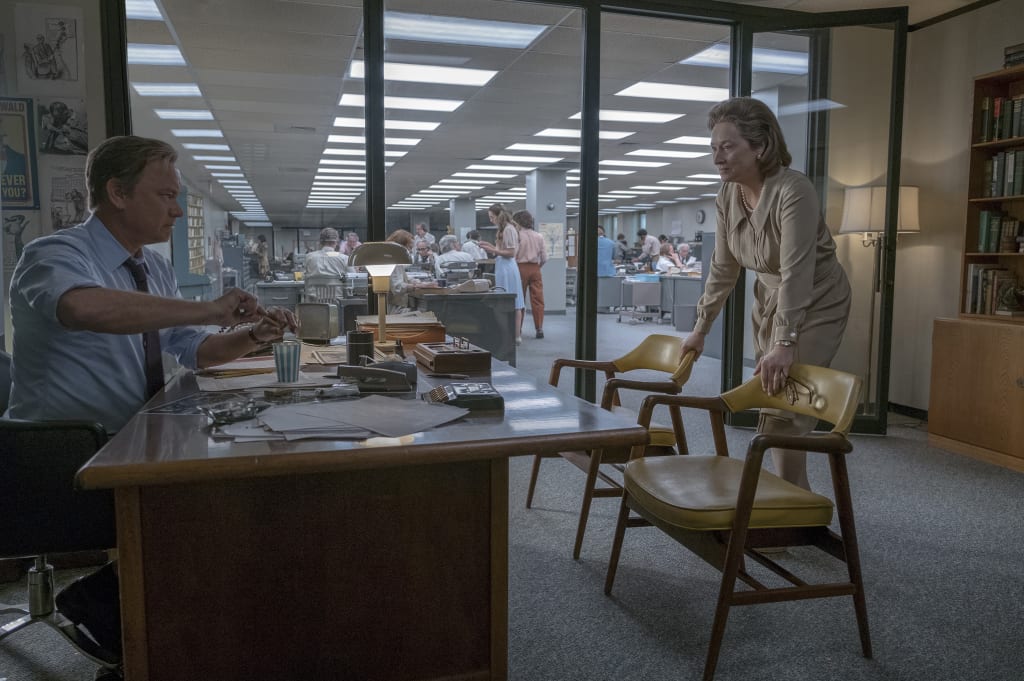Movie Review: 'The Post'
The First Truly Relevant Movie of the Trump Era

The Post is an of-the-moment history lesson about the important role of the media in America. Steven Speilberg has made arguably the most relevant movie of our political moment, given the way that President Trump has made attacking the media a staple of his public discourse. Casting two of America’s most beloved and respected actors in the lead roles only deepens the importance of The Post.
The title The Post refers to the Washington Post, which in 1971 battled the Nixon White House over the so-called Pentagon Papers. The Pentagon Papers refers to a study commissioned by then Secretary of State MacNamara, who tasked members of the Pentagon, including young genius, Daniel Ellsburg (Matthew Rhys), to study the state of the Vietnam War.
After not getting the positive returns that they had hoped to get, MacNamara lied to the media and tried to bury the report. Ellsburg then stole a copy of the report from Pentagon partners, The Rand Corporation, and made copies which he leaked to the New York Times. The Times began publishing the report in early 1971 in pieces before the Nixon White House took the Times to court to stop them.
This is where the Washington Post comes in. Speilberg picks up the story with a desperate Ben Bradlee (Tom Hanks) hammering his reporters to find out where the New York Times is getting their information. He wants a copy of the report so that the Post can publish them as well. While his reporters are scouring their sources, Bradlee’s boss, Katherine Graham (Meryl Streep) is battling with the board of directors over her position as owner of the company.
Graham’s tenuous position in charge of the paper is a big part of the drama. She’d taken over the paper several years earlier after her husband had taken his own life. She was not a popular choice as the new owner and the board has been looking for reasons to remove her for some time. With the Pentagon Papers in play and the potential of White House retribution against the paper, there is a great deal at stake if the Post gets the papers and attempts to publish.
This being a historical drama, we already know the outcome but that doesn’t stop the film from being dramatic and involving. Tom Hanks and Meryl Streep are incredible together as a duo of both bold intention and pragmatic consideration. Streep is especially good as Graham who has the best arc in the movie going from being strong but placating to bold and authoritative.
Speilberg captures the action with a hyper handheld style that is not typical of his films. Cinematographer Janusz Kaminski jumps into the action of the film in a style reminiscent of TV’s The West Wing, as the camera follows moving action throughout but is rarely off balance or out of focus in the way so many similarly made movies tend to be. The Post looks as lively and relevant as its subject matter.
Speilberg and Kaminski do wonders to give visual life to scenes that are not unlike stage plays, heavily reliant on dialogue rather than cinematic action. The style of Kaminski’s shooting under Speilbergs’s direction is dynamic and vital. The Post may not be emblematic of typical Steven Speilberg, but that is part of what makes the movie so much more than just a historical drama.
The Post also benefits from a superior supporting cast that includes Bob Odenkirk, David Cross, Michael Stuhlbarg, and Bradley Whitford in small but impactful roles in and out of the newsroom of the Washington Post. There is tremendous power in watching Odenkirk’s journalist at work, especially late in the film after the post has received the papers and then must piece together the conclusions of the report into articles.
You can feel the passion that Steven Speilberg has for this story of journalistic heroism. Speilberg delayed work on his massive, effects-heavy, kids' flick Ready Player One so that he could make The Post and have it in theaters during President Trump’s first year in office when the President has made a habit of attacking the media. Speilberg takes the relevance of this story very seriously, painting contrasts of President Nixon with President Trump and underlining each point of why a free and just media is so important.
The Post isn’t perfect. There are minor issues in length and pacing, a little obviousness in the three act structure as acts are seemingly announced by the loud arrival of turning point scenes, but these are minor complaints. I have been waiting throughout 2017 for a movie to be truly relevant and meaningful to our time. That it took some of the most well-known and popular actors and directors to finally pull it off says something about the state of Hollywood’s spine when it comes to tackling modern politics.
It took the untouchable trio of Speilberg, Streep, and Hanks to make the one truly relevant movie of 2017. Where is the rest of Hollywood? Everyone is quite brave on Twitter but no one has stepped up to make a movie like The Post, which pointedly makes the case of the modern American media in the face of Donald Trump. No other movie has shown the guts of The Post thus far in the Trump Presidency. Here’s hoping that other filmmakers will follow Speilberg, Streep, and Hanks' lead in the near future.
About the Creator
Sean Patrick
Hello, my name is Sean Patrick He/Him, and I am a film critic and podcast host for the I Hate Critics Movie Review Podcast I am a voting member of the Critics Choice Association, the group behind the annual Critics Choice Awards.






Comments
There are no comments for this story
Be the first to respond and start the conversation.